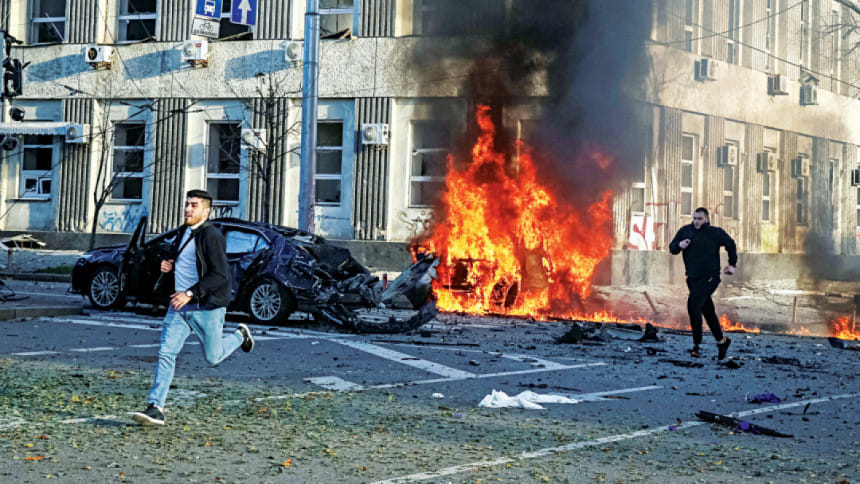War in Ukraine: Balancing act may get trickier for Bangladesh

Security analysts fear that the Ukraine-Russia war could intensify in the coming days, pushing the whole world into further trouble, unless there are serious peace initiatives to stop the war that began a year ago.
If the war continues, the world will become more polarised between the Sino-Russian bloc and the US-led bloc, and Bangladesh like many other countries that maintain a neutral stance will find it increasingly difficult to make a balance, they said.
Russia is now controlling a significant part of Eastern Ukraine and annexed it through a referendum.
"So, it is not easily leaving Crimea, which was annexed in 2014, and the newly annexed region," said Bangladesh Institute of Peace and Security Studies (BIPSS) President Maj Gen (retd) ANM Muniruzzaman.
"During the winter, the fighting took place at a comparatively low level, but as the spring is starting in March and the Western powers have pledged modern tanks to Ukraine, it is likely that the fighting will intensify then," he added.
"Ukraine also wanted fighter aircraft from the US, and if that is provided, there is a likelihood Russia will retaliate strongly. That will add a new dimension to the war," Muniruzzaman told this correspondent yesterday.
"We can see more and more militarisation in many countries as a result of the Ukraine-Russia war. Japan, for example, has significantly increased its defence budget," he added.
"Also, militarization is happening in European countries that have more sense of insecurity. Sweden and Finland are also trying to join NATO. The importance of NATO in Europe has increased manifold now -- in a policy shift from the Trump period when Europe sought to be independent of US influence in terms of security."
"Ukrainian president Zelensky is repeating that this is not a Ukraine war, but a European war. If there is an attack, even by accident, on a NATO member in Europe, the war will be expanded beyond Ukraine. If that happens, the war will take a serious turn," he said.
He said the war has also exposed a tendency that the West is losing its strategic weight. "For example, India is indifferent to the concerns of the US, especially when it comes to India buying energy from Russia. Also, Russia is finding new allies like Iran, North Korea, and Syria.
"Russia has definitely been affected by the US and European sanctions but not to the extent that was thought," Muniruzzaman said.
Another security analyst Maj Gen (retd) Abdur Rashid thinks that as US and EU are now stronger and more united than before, Russia will be on the back foot, while Ukraine energised by new weapons may retake the areas still under Russia's control.
"US President Biden's surprise visit to Kyiv and Poland means a lot for Ukraine. Russia already faced colossal loss in terms of its army and weapons," he added.
Abdur Rashid said the visit of Chinese top diplomat Wang Yi and the upcoming visit by Chinese President Xi Jinping to Moscow may be significant efforts for peace.
"I am hopeful that Ukraine and Russia are going to sit for talks. That's what is the most needed thing we want to see."
Otherwise, the world will face further challenges of hunger, energy crisis and inflation, said the security analysts.
Bangladesh, like many other countries, is already paying the price of the war, he said, adding that, the countries whose internal financial management is good are able to handle the situation, but those who don't are now facing real trouble.
"If the war goes on, the West will be in recession and Bangladesh's economy will be further affected as much of its export is to the US and Europe," Abdur Rashid said.
"To avert any further economic upheaval, Bangladesh's financial management should be improved," he said.
Muniruzzaman said Bangladesh should improve its diplomatic skills to navigate the new challenges in the new possibly highly polarised world to ensure the country's national interest.

 For all latest news, follow The Daily Star's Google News channel.
For all latest news, follow The Daily Star's Google News channel. 



Comments